Rudman Center Roundup: Politics, Immigration, Fiscal Policy, and Voting Rights
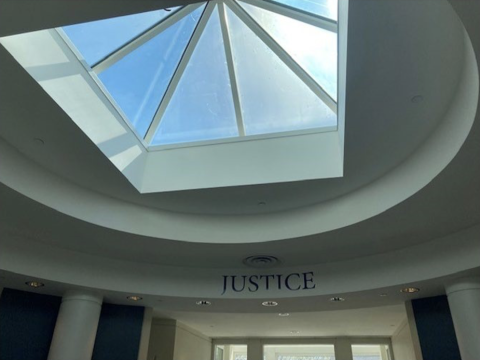
A Rudman Center Roundup
Politics, Immigration, Fiscal Policy, and Voting Rights: Rudman Center Conversations This Past Semester
Rudman Center events this winter/spring included a conversation with NPR White House Correspondent Asma Khalid and several panel discussions, including on U.S. immigration policy, voting issues reviewed by the New Hampshire Supreme Court, and fiscal challenges likely to face the next administration. Read on for more details.
Justice & Journalism Conversation with NPR White House Correspondent Asma Khalid
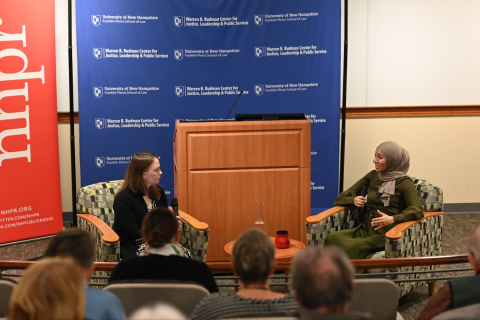
NHPR Senior News Editor Casey McDermott interviews Asma Khalid, NPR White House Correspondent
NPR White House Correspondent Asma Khalid discussed her experiences covering elections, political divides, and the Biden White House during a conversation moderated by NHPR Senior News Editor Casey McDermott. Khalid also described the benefits of growing up in a politically and socioeconomically diverse community in Indiana. Watch the event here. Read our writeup here.
Giving people the benefit of the doubt is very important, even if you have a very different world view. One of the things I felt really was important in covering politics that I wish we had a bit more of across the board is empathy, in terms of understanding where people are coming from. — Asma Khalid, NPR White House Correspondent
Immigration Policy: The Legal and Economic Aspects of Our Current System, and Prospects for Reform
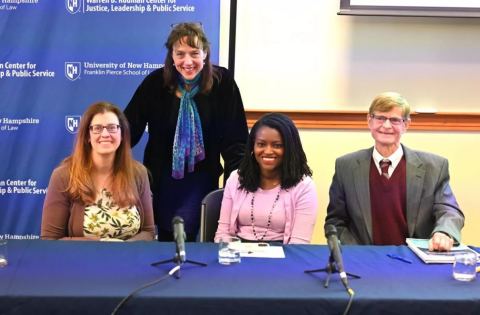
Theresa Cardinal Brown, the Bipartisan Policy Center; Laura Knoy, interim director of the Rudman Center; Lina Shayo, Mesa Law PLLC; Robert Bixby, the Concord Coalition
There are few political topics as fraught as immigration policy. During a discussion moderated by Rudman Center Interim Director Laura Knoy, panelists delved into the legal and economic complexities of our current system, as well as some common misconceptions, including fears among some Americans that immigrants will compete for their jobs. Watch the event here. Read our writeup here.
What makes for economic growth is a growing workforce and increased productivity of that workforce. Immigration can help with both. The more workers you have, the greater chance you have of having a productive economy. In this country, we have a workforce growth problem because of changing demographics. The baby boomer generation is aging. Workforce growth is actually much, much slower and is projected to be much, much slower in the future than it has been in the past. — Robert Bixby, the Concord Coalition
Voting, Democracy, and the Court
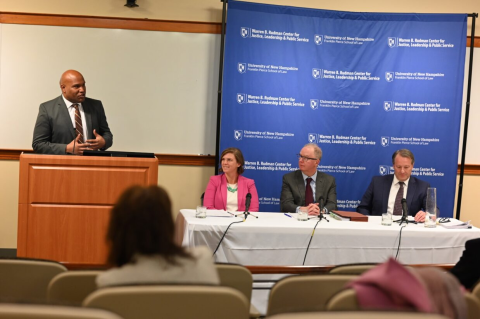
UNH Law Prof. Julian Jefferson; UNH Law Adjunct Prof. Kelsey Klementowicz; Bill Christie, Shaheen & Gordon, P.A.; Rick Lehmann, Lehmann Major List, PLLC.
During a discussion presented in partnership with the New Hampshire Supreme Court Society and moderated by UNH Franklin Pierce School of Law Professor Julian Jefferson, attorneys explored the ramifications of voting issues reviewed by the New Hampshire Supreme Court in recent years, including partisan gerrymandering, the independent state legislature theory, and criteria regarding who can vote. Watch the event here. Read our writeup here.
Gerrymandering has been going on since the beginning of the country. The problem is it's becoming more and more sophisticated. For legislatures who are drawing maps after every census, there are national groups assisting them with computer models that allow them to gerrymander not by county, not by town, but down to neighborhoods and houses within neighborhoods. And they can draw maps to effectively create an ongoing majority for the party that's in power at the time that the maps are drawn. — Bill Christie, Shaheen & Gordon, P.A.
Fiscal Challenges Facing the Next Administration
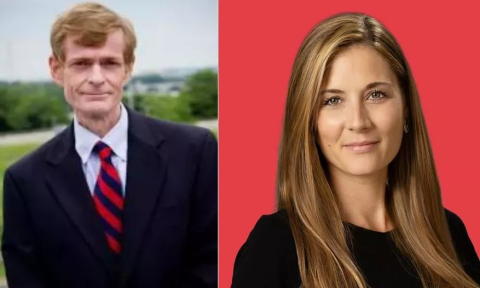
Robert Bixby of the Concord Coalition and Rachel Snyderman of the Bipartisan Policy Center
“The federal government faces an unsustainable long-term fiscal future,” warned the Government Accountability Office in its most recent report on America’s fiscal future. Bob Bixby, of the Concord Coalition, and Rachel Snyderman, of the Bipartisan Policy Center, joined Rudman Center Interim Director Laura Knoy for a discussion on key facets of this fiscal challenge, including the rising national debt, government spending, and taxes. Watch a video of the event here. Read our writeup here.
The political situation that we're in right now is certainly a contributing factor. Both sides agree that there's a challenge, but the solutions are different. The left pushes to raise taxes and the importance of intergenerational equity and the social safety net, but not touching entitlement programs. The right pushes to increase tax cuts and decrease government spending. But really the drivers of our debt are just this, that we're not bringing in enough revenue. — Rachel Snyderman, the Bipartisan Policy Center
